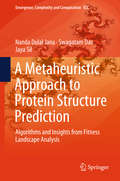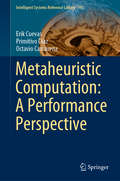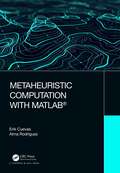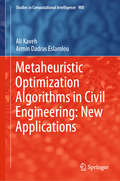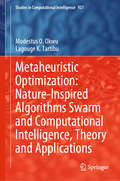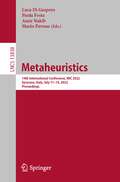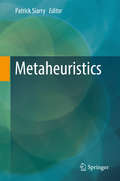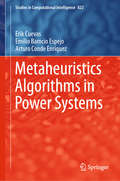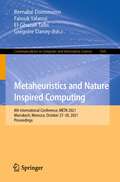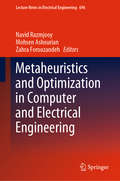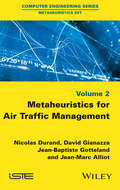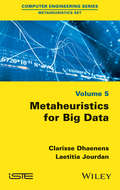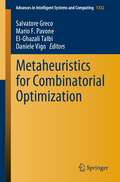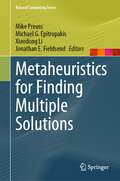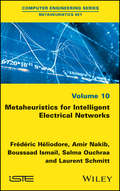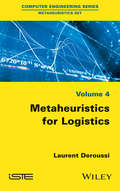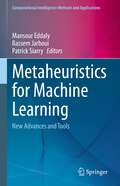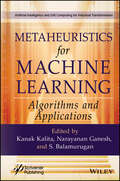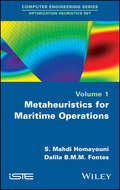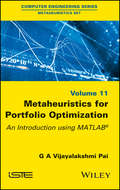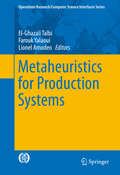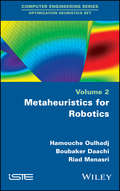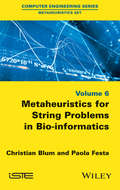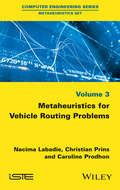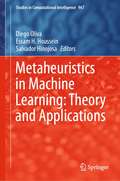- Table View
- List View
A Metaheuristic Approach to Protein Structure Prediction: Algorithms And Insights From Fitness Landscape Analysis (Emergence, Complexity And Computation Ser. #31)
by Nanda Dulal Jana Swagatam Das Jaya SilThis book introduces characteristic features of the protein structure prediction (PSP) problem. It focuses on systematic selection and improvement of the most appropriate metaheuristic algorithm to solve the problem based on a fitness landscape analysis, rather than on the nature of the problem, which was the focus of methodologies in the past. Protein structure prediction is concerned with the question of how to determine the three-dimensional structure of a protein from its primary sequence. Recently a number of successful metaheuristic algorithms have been developed to determine the native structure, which plays an important role in medicine, drug design, and disease prediction. This interdisciplinary book consolidates the concepts most relevant to protein structure prediction (PSP) through global non-convex optimization. It is intended for graduate students from fields such as computer science, engineering, bioinformatics and as a reference for researchers and practitioners.
Metaheuristic Computation: A Performance Perspective (Intelligent Systems Reference Library #195)
by Erik Cuevas Primitivo Diaz Octavio CamarenaThis book is primarily intended for undergraduate and postgraduate students of Science, Electrical Engineering, or Computational Mathematics. Metaheuristic search methods are so numerous and varied in terms of design and potential applications; however, for such an abundant family of optimization techniques, there seems to be a question which needs to be answered: Which part of the design in a metaheuristic algorithm contributes more to its better performance? Several works that compare the performance among metaheuristic approaches have been reported in the literature. Nevertheless, they suffer from one of the following limitations: (A)Their conclusions are based on the performance of popular evolutionary approaches over a set of synthetic functions with exact solutions and well-known behaviors, without considering the application context or including recent developments. (B) Their conclusions consider only the comparison of their final results which cannot evaluate the nature of a good or bad balance between exploration and exploitation. The objective of this book is to compare the performance of various metaheuristic techniques when they are faced with complex optimization problems extracted from different engineering domains. The material has been compiled from a teaching perspective.
Metaheuristic Computation with MATLAB®
by Erik Cuevas Alma RodriguezMetaheuristic algorithms are considered as generic optimization tools that can solve very complex problems characterized by having very large search spaces. Metaheuristic methods reduce the effective size of the search space through the use of effective search strategies. Book Features: Provides a unified view of the most popular metaheuristic methods currently in use Includes the necessary concepts to enable readers to implement and modify already known metaheuristic methods to solve problems Covers design aspects and implementation in MATLAB® Contains numerous examples of problems and solutions that demonstrate the power of these methods of optimization The material has been written from a teaching perspective and, for this reason, this book is primarily intended for undergraduate and postgraduate students of artificial intelligence, metaheuristic methods, and/or evolutionary computation. The objective is to bridge the gap between metaheuristic techniques and complex optimization problems that profit from the convenient properties of metaheuristic approaches. Therefore, engineer practitioners who are not familiar with metaheuristic computation will appreciate that the techniques discussed are beyond simple theoretical tools, since they have been adapted to solve significant problems that commonly arise in such areas.
Metaheuristic Optimization Algorithms in Civil Engineering: New Applications (Studies in Computational Intelligence #900)
by Ali Kaveh Armin Dadras EslamlouThis book discusses the application of metaheuristic algorithms in a number of important optimization problems in civil engineering. Advances in civil engineering technologies require greater accuracy, efficiency and speed in terms of the analysis and design of the corresponding systems. As such, it is not surprising that novel methods have been developed for the optimal design of real-world systems and models with complex configurations and large numbers of elements. This book is intended for scientists, engineers and students wishing to explore the potential of newly developed metaheuristics in practical problems. It presents concepts that are not only applicable to civil engineering problems, but can also used for optimizing problems related to mechanical, electrical, and industrial engineering. It is an essential resource for civil, mechanical and electrical engineers who use optimization methods for design, as well as for students and researchers interested in structural optimization.
Metaheuristic Optimization: Nature-Inspired Algorithms Swarm and Computational Intelligence, Theory and Applications (Studies in Computational Intelligence #927)
by Modestus O. Okwu Lagouge K. TartibuThis book exemplifies how algorithms are developed by mimicking nature. Classical techniques for solving day-to-day problems is time-consuming and cannot address complex problems. Metaheuristic algorithms are nature-inspired optimization techniques for solving real-life complex problems. This book emphasizes the social behaviour of insects, animals and other natural entities, in terms of converging power and benefits. Major nature-inspired algorithms discussed in this book include the bee colony algorithm, ant colony algorithm, grey wolf optimization algorithm, whale optimization algorithm, firefly algorithm, bat algorithm, ant lion optimization algorithm, grasshopper optimization algorithm, butterfly optimization algorithm and others. The algorithms have been arranged in chapters to help readers gain better insight into nature-inspired systems and swarm intelligence. All the MATLAB codes have been provided in the appendices of the book to enable readers practice how to solve examples included in all sections. This book is for experts in Engineering and Applied Sciences, Natural and Formal Sciences, Economics, Humanities and Social Sciences.
Metaheuristics: 14th International Conference, MIC 2022, Syracuse, Italy, July 11–14, 2022, Proceedings (Lecture Notes in Computer Science #13838)
by Luca Di Gaspero Paola Festa Amir Nakib Mario PavoneThis book constitutes the refereed proceedings of the 14th International Conference on Metaheuristics, MIC 2022, held in Syracuse, Italy, in July 2022.The 48 full papers together with 17 short papers presented were carefully reviewed and selected from 72 submissions. The papers detail metaheuristic techniques.
Metaheuristics
by Patrick SiarryMetaheuristics exhibit desirable properties like simplicity, easy parallelizability, and ready applicability to different types of optimization problems. After a comprehensive introduction to the field, the contributed chapters in this book include explanations of the main metaheuristics techniques, including simulated annealing, tabu search, evolutionary algorithms, artificial ants, and particle swarms, followed by chapters that demonstrate their applications to problems such as multiobjective optimization, logistics, vehicle routing, and air traffic management. The authors are leading researchers in this domain, with considerable teaching and applications experience, and the book will be of value to industrial practitioners, graduate students, and research academics.
Metaheuristics Algorithms in Power Systems (Studies in Computational Intelligence #822)
by Erik Cuevas Emilio Barocio Espejo Arturo Conde EnríquezThis book discusses the use of efficient metaheuristic algorithms to solve diverse power system problems, providing an overview of the various aspects of metaheuristic methods to enable readers to gain a comprehensive understanding of the field and of conducting studies on specific metaheuristic algorithms related to power-system applications. By bridging the gap between recent metaheuristic techniques and novel power system methods that benefit from the convenience of metaheuristic methods, it offers power system practitioners who are not metaheuristic computation researchers insights into the techniques, which go beyond simple theoretical tools and have been adapted to solve important problems that commonly arise. On the other hand, members of the metaheuristic computation community learn how power engineering problems can be translated into optimization tasks, and it is also of interest to engineers and application developers. Further, since each chapter can be read independently, the relevant information can be quickly found. Power systems is a multidisciplinary field that addresses the multiple approaches used for design and analysis in areas ranging from signal processing, and electronics to computational intelligence, including the current trend of metaheuristic computation.
Metaheuristics and Nature Inspired Computing: 8th International Conference, META 2021, Marrakech, Morocco, October 27-30, 2021, Proceedings (Communications in Computer and Information Science #1541)
by Farouk Yalaoui Grégoire Danoy Bernabé Dorronsoro El-Ghazali TalbiThis volume constitutes selected papers presented during the 8th International Conference on Metaheuristics and Nature Inspired Computing, META 2021, held in Marrakech, Morocco, in October 201. Due to the COVID-19 pandemic the conference was partiqally held online. The 16 papers were thoroughly reviewed and selected from the 53 submissions. They are organized in the topical sections on combinatorial optimization; continuous optimization; optimization and machine learning; applications.
Metaheuristics and Optimization in Computer and Electrical Engineering (Lecture Notes in Electrical Engineering #696)
by Navid Razmjooy Mohsen Ashourian Zahra ForoozandehThe use of artificial intelligence, especially in the field of optimization is increasing day by day. The purpose of this book is to explore the possibility of using different kinds of optimization algorithms to advance and enhance the tools used for computer and electrical engineering purposes.
Metaheuristics for Air Traffic Management
by Jean-Marc Alliot Jean-Baptiste Gotteland Nicolas Durand David GianazzaAir Traffic Management involves many different services such as Airspace Management, Air Traffic Flow Management and Air Traffic Control. Many optimization problems arise from these topics and they generally involve different kinds of variables, constraints, uncertainties. Metaheuristics are often good candidates to solve these problems. The book models various complex Air Traffic Management problems such as airport taxiing, departure slot allocation, en route conflict resolution, airspace and route design. The authors detail the operational context and state of art for each problem. They introduce different approaches using metaheuristics to solve these problems and when possible, compare their performances to existing approaches
Metaheuristics for Big Data
by Laetitia Jourdan Clarisse DhaenensThis book deals with the management and valuation of energy storage in electric power grids, highlighting the interest of storage systems in grid applications and developing management methodologies based on artificial intelligence tools. The authors highlight the importance of storing electrical energy, in the context of sustainable development, in "smart cities" and "smart transportation", and discuss multiple services that storing electrical energy can bring. Methodological tools are provided to build an energy management system storage following a generic approach. These tools are based on causal formalisms, artificial intelligence and explicit optimization techniques and are presented throughout the book in connection with concrete case studies.
Metaheuristics for Combinatorial Optimization (Advances in Intelligent Systems and Computing #1332)
by Salvatore Greco Mario F. Pavone El-Ghazali Talbi Daniele VigoThis book presents novel and original metaheuristics developed to solve the cost-balanced traveling salesman problem. This problem was taken into account for the Metaheuristics Competition proposed in MESS 2018, Metaheuristics Summer School, and the top 4 methodologies ranked are included in the book, together with a brief introduction to the traveling salesman problem and all its variants. The book is aimed particularly at all researchers in metaheuristics and combinatorial optimization areas. Key uses are metaheuristics; complex problem solving; combinatorial optimization; traveling salesman problem.
Metaheuristics for Finding Multiple Solutions (Natural Computing Series)
by Mike Preuss Michael G. Epitropakis Xiaodong Li Jonathan E. FieldsendThis book presents the latest trends and developments in multimodal optimization and niching techniques. Most existing optimization methods are designed for locating a single global solution. However, in real-world settings, many problems are “multimodal” by nature, i.e., multiple satisfactory solutions exist. It may be desirable to locate several such solutions before deciding which one to use. Multimodal optimization has been the subject of intense study in the field of population-based meta-heuristic algorithms, e.g., evolutionary algorithms (EAs), for the past few decades. These multimodal optimization techniques are commonly referred to as “niching” methods, because of the nature-inspired “niching” effect that is induced to the solution population targeting at multiple optima. Many niching methods have been developed in the EA community. Some classic examples include crowding, fitness sharing, clearing, derating, restricted tournament selection, speciation, etc. Nevertheless, applying these niching methods to real-world multimodal problems often encounters significant challenges.To facilitate the advance of niching methods in facing these challenges, this edited book highlights the latest developments in niching methods. The included chapters touch on algorithmic improvements and developments, representation, and visualization issues, as well as new research directions, such as preference incorporation in decision making and new application areas. This edited book is a first of this kind specifically on the topic of niching techniques.This book will serve as a valuable reference book both for researchers and practitioners. Although chapters are written in a mutually independent way, Chapter 1 will help novice readers get an overview of the field. It describes the development of the field and its current state and provides a comparative analysis of the IEEE CEC and ACM GECCO niching competitions of recent years, followed by a collection of open research questions and possible research directions that may be tackled in the future.
Metaheuristics for Intelligent Electrical Networks
by Amir Nakib Boussaad Ismail Frédéric Héliodore Laurent Schmitt Salma OuchraaThe optimization tools are ubiquitous in modeling and the use of electrical networks. Managing the complexity of these electrical networks leads to analyze and define new methodologies, able to combine performance and near-operational processing. Metaheuristics offer a range of solutions as efficient as they are innovative.
Metaheuristics for Logistics
by Laurent DeroussiThis book describes the main classical combinatorial problems that can be encountered when designing a logistics network or driving a supply chain. It shows how these problems can be tackled by metaheuristics, both separately and using an integrated approach. A huge number of techniques, from the simplest to the most advanced ones, are given for helping the reader to implement efficient solutions that meet its needs. A lot of books have been written about metaheuristics (methods for solving hard optimization problems) and supply chain management (the field in which we find a huge number of combinatorial optimization problems) in the last decades. So, the main reason of this book is to describe how these methods can be implemented for this class of problems.
Metaheuristics for Machine Learning: New Advances and Tools (Computational Intelligence Methods and Applications)
by Mansour Eddaly Bassem Jarboui Patrick SiarryUsing metaheuristics to enhance machine learning techniques has become trendy and has achieved major successes in both supervised (classification and regression) and unsupervised (clustering and rule mining) problems. Furthermore, automatically generating programs via metaheuristics, as a form of evolutionary computation and swarm intelligence, has now gained widespread popularity. This book investigates different ways of integrating metaheuristics into machine learning techniques, from both theoretical and practical standpoints. It explores how metaheuristics can be adapted in order to enhance machine learning tools and presents an overview of the main metaheuristic programming methods. Moreover, real-world applications are provided for illustration, e.g., in clustering, big data, machine health monitoring, underwater sonar targets, and banking.
Metaheuristics for Machine Learning: Algorithms and Applications (Artificial Intelligence and Soft Computing for Industrial Transformation)
by Kanak Kalita Narayanan Ganesh S. BalamuruganMETAHEURISTICS for MACHINE LEARNING The book unlocks the power of nature-inspired optimization in machine learning and presents a comprehensive guide to cutting-edge algorithms, interdisciplinary insights, and real-world applications. The field of metaheuristic optimization algorithms is experiencing rapid growth, both in academic research and industrial applications. These nature-inspired algorithms, which draw on phenomena like evolution, swarm behavior, and neural systems, have shown remarkable efficiency in solving complex optimization problems. With advancements in machine learning and artificial intelligence, the application of metaheuristic optimization techniques has expanded, demonstrating significant potential in optimizing machine learning models, hyperparameter tuning, and feature selection, among other use-cases. In the industrial landscape, these techniques are becoming indispensable for solving real-world problems in sectors ranging from healthcare to cybersecurity and sustainability. Businesses are incorporating metaheuristic optimization into machine learning workflows to improve decision-making, automate processes, and enhance system performance. As the boundaries of what is computationally possible continue to expand, the integration of metaheuristic optimization and machine learning represents a pioneering frontier in computational intelligence, making this book a timely resource for anyone involved in this interdisciplinary field. Metaheuristics for Machine Learning: Algorithms and Applications serves as a comprehensive guide to the intersection of nature-inspired optimization and machine learning. Authored by leading experts, this book seamlessly integrates insights from computer science, biology, and mathematics to offer a panoramic view of the latest advancements in metaheuristic algorithms. You’ll find detailed yet accessible discussions of algorithmic theory alongside real-world case studies that demonstrate their practical applications in machine learning optimization. Perfect for researchers, practitioners, and students, this book provides cutting-edge content with a focus on applicability and interdisciplinary knowledge. Whether you aim to optimize complex systems, delve into neural networks, or enhance predictive modeling, this book arms you with the tools and understanding you need to tackle challenges efficiently. Equip yourself with this essential resource and navigate the ever-evolving landscape of machine learning and optimization with confidence. Audience The book is aimed at a broad audience encompassing researchers, practitioners, and students in the fields of computer science, data science, engineering, and mathematics. The detailed but accessible content makes it a must-have for both academia and industry professionals interested in the optimization aspects of machine learning algorithms.
Metaheuristics for Maritime Operations
by S. Mahdi Homayouni Dalila B.M.M. FontesMetaheuristic Algorithms in Maritime Operations Optimization focuses on the seaside and port side problems regarding the maritime transportation. The book reviews and introduces the most important problems regarding the shipping network design, long-term and short-term scheduling and planning problems in both bulk and container shipping as well as liquid maritime transportation. Application of meta heuristic algorithm is important for these problems, as most of them are hard and time-consuming to be solved optimally.
Metaheuristics for Portfolio Optimization: An Introduction using MATLAB
by G. A. Vijayalakshmi PaiThe book is a monograph in the cross disciplinary area of Computational Intelligence in Finance and elucidates a collection of practical and strategic Portfolio Optimization models in Finance, that employ Metaheuristics for their effective solutions and demonstrates the results using MATLAB implementations, over live portfolios invested across global stock universes. The book has been structured in such a way that, even novices in finance or metaheuristics should be able to comprehend and work on the hybrid models discussed in the book.
Metaheuristics for Production Systems
by El-Ghazali Talbi Farouk Yalaoui Lionel AmodeoThis book discusses the main techniques and newest trends to manage and optimize the production and service systems. The book begins by examining the three main levels of decision systems in production: the long term (strategic), the middle term (tactical) and short term (operational). It also considers online management as a new level (a sub level of the short term). As each level encounters specific problems, appropriate approaches to deal with these are introduced and explained. These problems include the line design, the line balancing optimization, the physical layout of the production or service system, the forecasting optimization, the inventory management, the scheduling etc. Metaheuristics for Production Systems then explores logistic optimization from two different perspectives: internal (production management), addressing issues of scheduling, layout and line designs, and external (supply chain management) focusing on transportation optimization, supply chain evaluation, and location of production. The book also looks at NP-hard problems that are common in production management. These complex configurations may mean that optimal solutions may not be reached due to variables, but the authors help provide a good solution for such problems. The effective new results and solutions offered in this book should appeal to researchers, managers, and engineers in the production and service industries.
Metaheuristics for Robotics
by Hamouche Oulhadj Boubaker Daachi Riad MenasriThis book is dedicated to the application of metaheuristic optimization in trajectory generation and control issues in robotics. In this area, as in other fields of application, the algorithmic tools addressed do not require a comprehensive list of eligible solutions to effectively solve an optimization problem. This book investigates how, by reformulating the problems to be solved, it is possible to obtain results by means of metaheuristics. Through concrete examples and case studies – particularly related to robotics – this book outlines the essentials of what is needed to reformulate control laws into concrete optimization data. The resolution approaches implemented – as well as the results obtained – are described in detail, in order to give, as much as possible, an idea of metaheuristics and their performance within the context of their application to robotics.
Metaheuristics for String Problems in Bio-informatics
by Christian Blum Paola FestaThis book will present the latest research on metaheuristic algorithms for some of the most important string problems in bio-informatics. Optimization problems related to strings---such as protein or DNA sequences---are very common in bioinformatics. Examples include string selection problems such as the "far from most string" problem, and other string problems such as the longest common subsequence problem and its variants, alignment problems, and similarity search. These problems are often computationally very hard. Therefore, during the last 10-15 years the research community has focused especially on metaheuristic algorithms for solving this type of problems. This book aims at presenting some of the most interesting recent work in this line of research.
Metaheuristics for Vehicle Routing Problems
by Nacima Labadie Caroline Prodhon Christian PrinsThis book is dedicated to metaheuristics as applied to vehicle routing problems. Several implementations are given as illustrative examples, along with applications to several typical vehicle routing problems. As a first step, a general presentation intends to make the reader more familiar with the related field of logistics and combinatorial optimization. This preamble is completed with a description of significant heuristic methods classically used to provide feasible solutions quickly, and local improvement moves widely used to search for enhanced solutions. The overview of these fundamentals allows appreciating the core of the work devoted to an analysis of metaheuristic methods for vehicle routing problems. Those methods are exposed according to their feature of working either on a sequence of single solutions, or on a set of solutions, or even by hybridizing metaheuristic approaches with others kind of methods.
Metaheuristics in Machine Learning: Theory and Applications (Studies in Computational Intelligence #967)
by Diego Oliva Salvador Hinojosa Essam H. HousseinThis book is a collection of the most recent approaches that combine metaheuristics and machine learning. Some of the methods considered in this book are evolutionary, swarm, machine learning, and deep learning. The chapters were classified based on the content; then, the sections are thematic. Different applications and implementations are included; in this sense, the book provides theory and practical content with novel machine learning and metaheuristic algorithms.The chapters were compiled using a scientific perspective. Accordingly, the book is primarily intended for undergraduate and postgraduate students of Science, Engineering, and Computational Mathematics and is useful in courses on Artificial Intelligence, Advanced Machine Learning, among others. Likewise, the book is useful for research from the evolutionary computation, artificial intelligence, and image processing communities.
